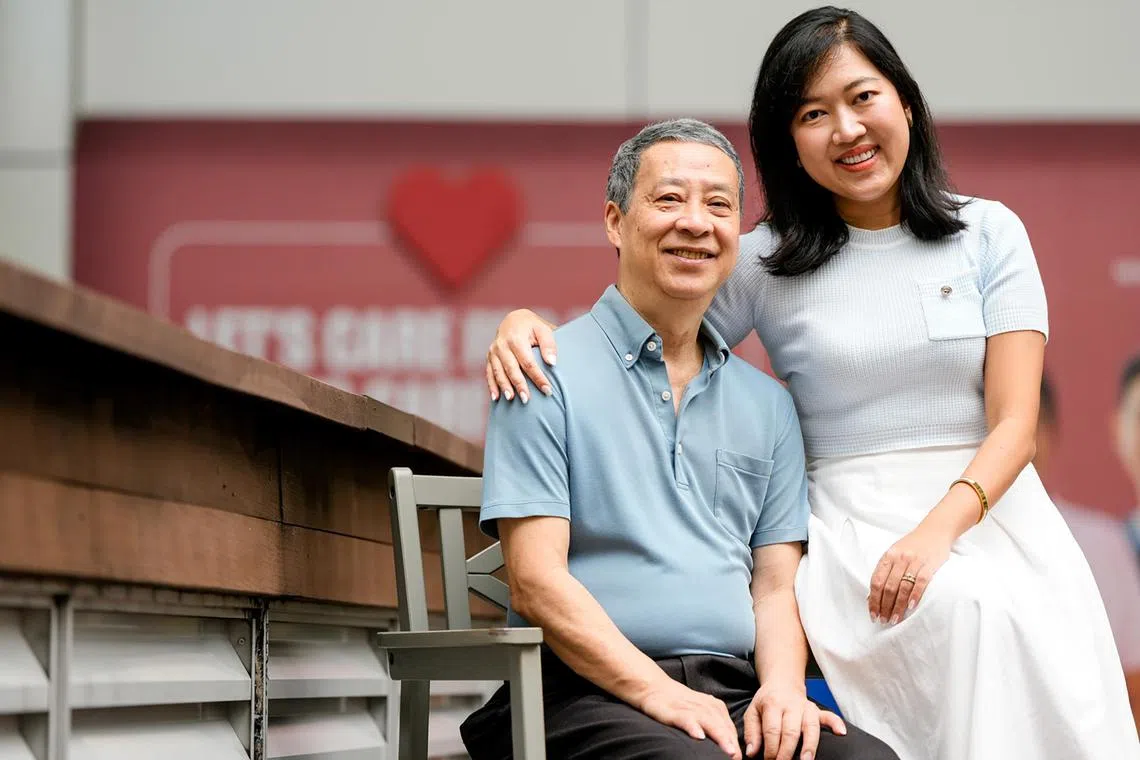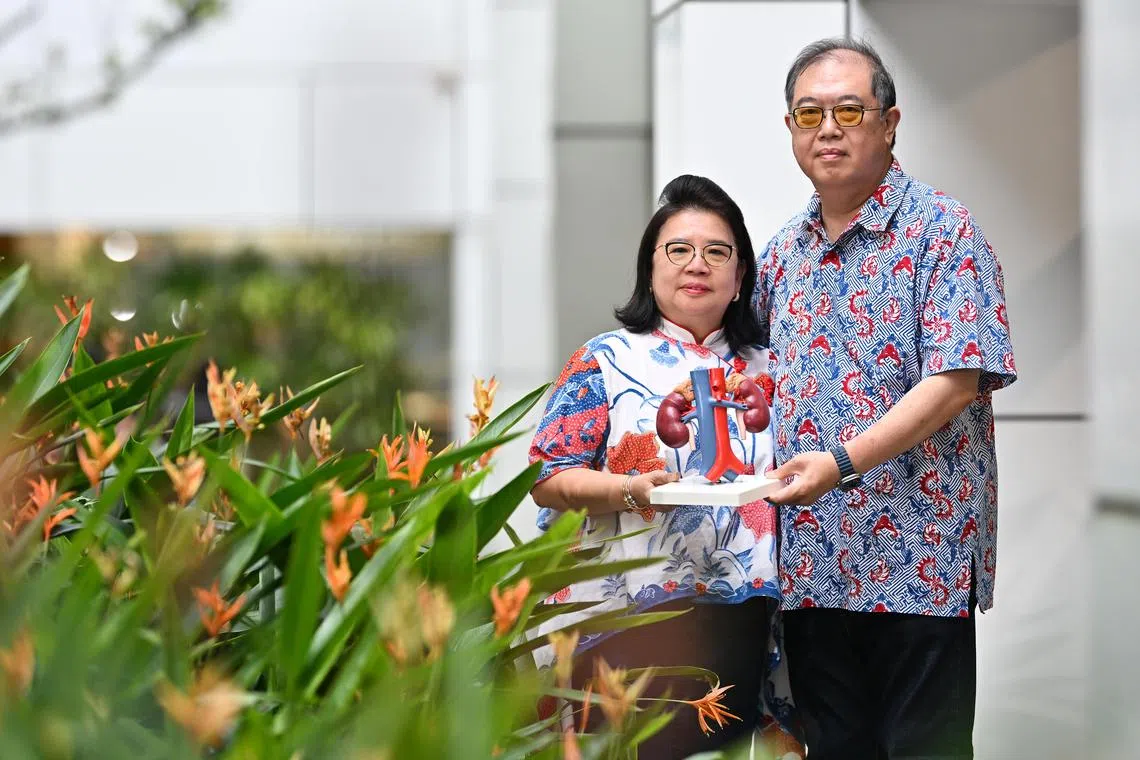Love that saves lives: Seniors in Singapore overcome challenges to donate organs
Sign up now: Get ST's newsletters delivered to your inbox

(From left) Ms Joreen Poh, a senior transplant coordinator with Nucot at NUH; senior consultant Benjamin Goh and medical director Hersharan Kaur Sran of the Adult Kidney Transplantation Programme at Nucot; kidney donor Chan Yew Weng; and kidney recipient Tan Kim Loon with his kidney donor, his wife Marjorie Tey.
ST PHOTO: LIM YAOHUI
Follow topic:
- Two Singaporean seniors, aged 60 and above donated kidneys to family members, highlighting the profound impact of older donors.
- Chan's kidney donation to his daughter-in-law Hazel Tan led to the discovery and repair of a life-threatening aneurysm near his spleen.
- Madam Tey donated a kidney to her husband who was on dialysis, fulfilling their marriage vows, and they celebrated with a trip to Britain and Norway.
AI generated
SINGAPORE – Despite undergoing treatment for a bulging blood vessel near the spleen just a month earlier, former church manager Chan Yew Weng, 68, donated a kidney to his daughter-in-law Hazel Tan, 35, in January.
Retiree Marjorie Tey, 59, also donated a kidney to her husband, Mr Tan Kim Loon – a gift that marked his 60th birthday, which fell on National Day.
Mr Chan and Madam Tey are among a small group of older live organ donors in Singapore. Despite their age, doctors said seniors can have just as profound an impact on lives as younger donors.
In Singapore, the two main hospitals with well-established kidney transplant programmes are the National University Hospital (NUH) and Singapore General Hospital (SGH).
The National University Centre for Organ Transplantation (Nucot) at NUH has a strong track record in both living and deceased donor transplants, while SGH has the oldest and largest renal transplant programme in the country.
The first kidney transplant in Singapore – involving a dead donor – took place in 1970, according to SingHealth’s website. This was followed by the first living related donor transplant in 1976.
In 2024, Singapore had 103 kidney transplants – 57 cases involving living donors and 46 with dead donors.
The average wait time for a kidney from a dead donor is 97 months, or around eight years, according to a website of the National Organ Transplant Unit.
Since its establishment in 1970, Nucot has facilitated kidney donations from 65 people aged 60 and above, including Singapore’s oldest kidney donor at age 79
Adjunct Associate Professor Hersharan Kaur Sran, medical director of the Adult Kidney Transplantation Programme at Nucot, said: “On average, a living donor transplant in Nucot, which has one of the best outcomes in the world, (allows the kidney to survive for) around 21 years.”
She noted that patients typically survive longer than that, though the survival period may be slightly shorter for those whose donors are older.
This means that Ms Tan – Mr Chan’s 35-year-old daughter-in-law – may need a second transplant in her lifetime, said Prof Hersharan.
“Sometimes the transplant may last 30 years, but that would still take the patient to her 60s, so it is not inconceivable that she may need a second transplant in her lifetime, which was a relevant concern for the family,” she said.
Donation saves life, reveals aneurysm
Ms Tan, a co-founder of Singapore-based digital healthcare provider Cloud Clinic (Sire and Dame), said her difficult pregnancy in 2018 resulted in a deteriorating kidney condition, caused by preeclampsia and the physical stress of carrying a foetus.
Preeclampsia is characterised by high blood pressure and high levels of protein in the urine, indicating kidney damage.
“My kidney condition continued to decline to end-stage renal failure in 2022. I was faced with the option of a kidney donation, or dialysis. This period was a dark time for our family, with a three-year-old (son to care for),” Ms Tan recalled.
Prof Hersharan said: “For someone in their 30s with a young child, being on dialysis is not anywhere near a normal life, and you want to live long enough to see (your child) grow up. Having a transplant (would) make a difference in family life.”
She added that living donor transplants, especially from family members, often result in better outcomes.
Ms Tan’s father-in-law and husband were both found to be compatible with her, though her father-in-law’s age, pre-diabetes and prostate issues posed some challenges.
Still, Mr Chan insisted on donating one of his kidneys to Ms Tan.

Despite his multiple health problems including pre-diabetes and prostate issues, Mr Chan Yew Weng, 68, gave one of his kidneys to his daughter-in-law Hazel Tan, 35.
PHOTO: NUH
“I told her on the day she married my son that there was no such thing as in-laws. She had become a daughter, and a father is willing to do anything for his daughter,” Mr Chan told reporters.
“I also told my son, who was willing to donate a kidney to his wife, that his was on stand-by in case the one I donated failed,” Mr Chan said.
Determined to get his health on track to donate his kidney, Mr Chan put himself on a strict exercise regimen, increasing his gym workout from an hour to two hours daily, including a 30-minute swim.
“Also, if it were not for the check-ups to ensure that I was good to go (for the transplant), the doctors would not have found the aneurysm near my spleen. I had to have it ‘repaired’, otherwise my life would have been in danger,” Mr Chan said.
The rare but potentially serious condition occurs when the splenic artery, which supplies blood to the spleen, develops a bulge.
Prof Hersharan said surgeons closed off the aneurysm and Mr Chan recovered quickly.
The transplant was eventually carried out in January.
“My father-in-law and I have gotten even closer now. We even continue our healthcare journey together, sharing medical reviews and experiences,” Ms Tan said.
In sickness or in health, till death do us part
Madam Tey took her marriage vows to heart, so when her husband’s kidneys failed, she did not hesitate to give him one of hers.
“(My husband) started his dialysis on June 17, 2021. There was no freedom, no free time, no travelling as he was tied to the machine. That was during the Covid-19 pandemic,” she said.
Over 2½ years, the Tans – who are both retired – made many trips to the emergency room as Mr Tan would often faint due to low blood pressure.

Madam Marjorie Tey took her marriage vows to heart, so when her husband Tan Kim Loon’s kidneys failed, she did not hesitate to give him one of hers.
ST PHOTO: LIM YAOHUI
“The doctor gave us options – continue with dialysis, which was not a long-term solution – or go for transplant. Without any hesitation, I agreed (to the transplant),” Madam Tey said.
The couple refused to let their two daughters donate their kidneys. Their 31-year-old daughter works in the United States, while the younger one, who is 28, is an early childhood teacher in Singapore. Both are not married.
“It was a peaceful and easy decision for me as I wanted to fight alongside him, to journey together. After all, according to our marriage vows, we promised each other to be together ‘in sickness or in health, till death do us part’, for as long as we have,” Madam Tey said.
“While he was not critically ill, it was painful to watch him struggle, and we were always living in fear and uncertainty.”
To prepare for the surgery, Madam Tey had to reduce not only her weight, but also her blood pressure and sugar levels.
Working closely with a dietitian to change her diet, she took months to get her weight and sugar levels down to a point where the doctors were satisfied.
She lost more than 5kg in about two months, and was cleared for surgery in March 2024.
Although Madam Tey was optimistic about the surgery, she still became emotional and was constantly updated on her husband’s condition by the medical team.
Said Mr Tan: “I was also kept in the know on Marjorie’s (condition)”.
Both donors had their kidneys extracted using keyhole surgery.
Adjunct Associate Professor Benjamin Goh, a senior consultant with Nucot’s Adult Kidney Transplantation Programme, said the kidneys were removed through the bikini line – where caesarean sections are carried out – “as that is where the natural fold of the body exists”.
“There is less pain. We do not cut the muscles. Instead, we split the muscles, take out the kidney and let (the incision) close. There is less pain and the scarring is much better. Over the years, we had improved the technique and brought down the number of days that the patients stayed at the hospital,” he said.
Prof Goh said it took about 2½ to three hours to operate on the donors and about three to 3½ hours to transplant the kidney into the recipients.
Kidney recipients have to take anti-rejection drugs for life, while donors do not need to be on medication.
The Tans recently celebrated their new-found freedom with a three-week holiday to Britain and Norway.
In conjunction with SG60, and to celebrate family love and the precious gift of life, Nucot is hosting a Family Day event on Aug 17 at the NUHS Tower Block.


